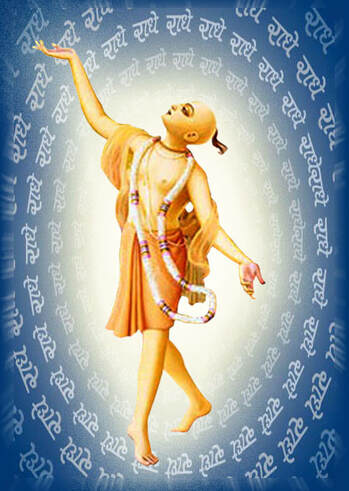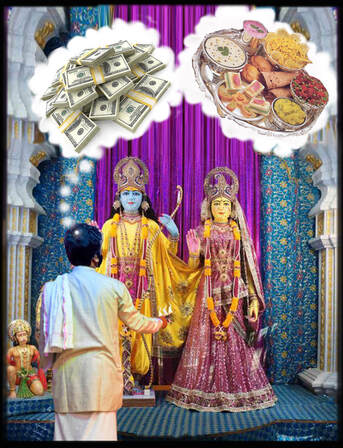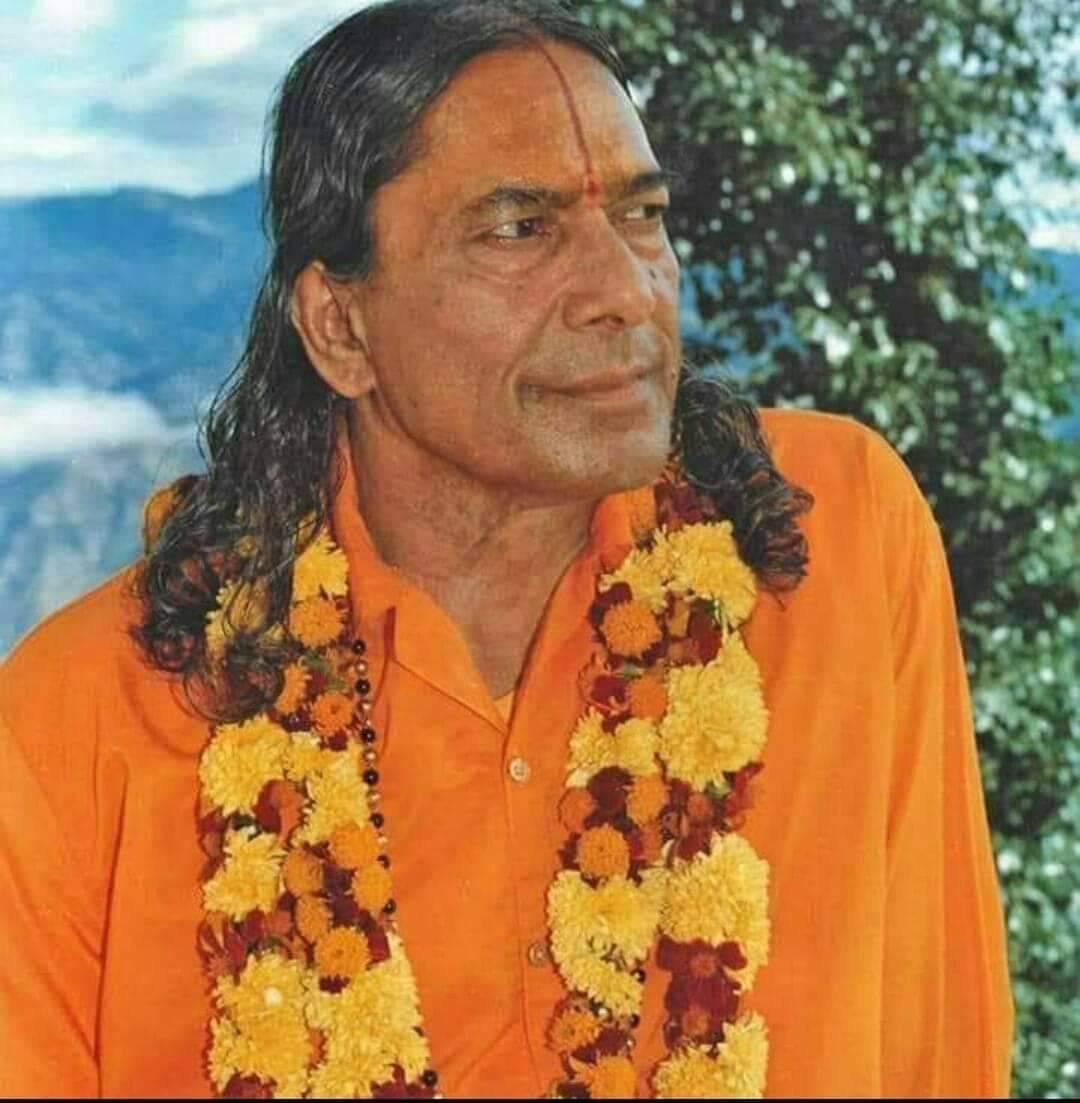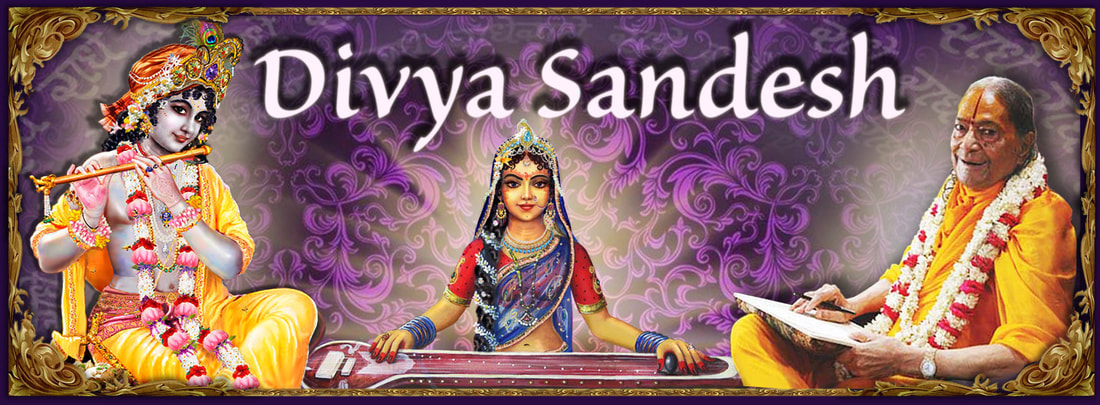
Question :
It is said that “God is patit-pawan (पतित-पावन), which means He is a redeemer of all sinners.” Does it mean that,
Answer :
Undoubtedly, innocent people misinterpret this statement. Additionally, they might even quote the words and sayings of God realized Saints to prove their point. For example, Chaitanya Mahaprabhu says,
It is said that “God is patit-pawan (पतित-पावन), which means He is a redeemer of all sinners.” Does it mean that,
- we are not sinners for if we were, we would have been redeemed by now? OR
- we should commit even more sins so as to qualify for His redemption?
Answer :
Undoubtedly, innocent people misinterpret this statement. Additionally, they might even quote the words and sayings of God realized Saints to prove their point. For example, Chaitanya Mahaprabhu says,
|
दीनबंधुरिति नाम ते स्मरन् यादवेन्द्र पतितोऽहमुत्सहे ।
भक्तवत्सलतया इति श्रुते मामकं हृदयमाशु कम्पते ॥ गौ. महा.
dīnabaṃdhuriti nāma te smaran yādavendra patito'hamutsahe ।
bhaktavatsalatayā iti śrute māmakaṃ hṛdayamāśu kampate ॥ gau. mahā.
"When I hear that You are affectionate towards your devotees I shiver in fear (as I don’t consider myself worthy of being called a devotee and hence will never qualify to get your affection). However, I muster some courage when I hear that, “You are the redeemer of fallen souls."
Likewise, Shri Kripalu Ji Maharaj says, मेरे जैसा पतित न, गोविंद राधे । तेरे जैसा पावन न, पावन बना दे ॥
mere jaisā patita na, goviṃda rādhe । tere jaisā pāvana na, pāvana banā de ॥ “O Govind Radhe ! There is no soul more fallen than me and there is no personality as pure as You. So please grace me and purify my being."
|
Yes, God is patit-pawan (पतित-पावन), which means the one who purifies the sinners. But it is sheer lunacy to continue to commit sins, just because it is the nature of God to be patit-pawan. Vedas are scared of this kind of people who twist Their real meaning to something completely different, to suit their own narrative. Vedas say,
विभत्यल्पश्रुताद् वेदो मामयं प्रहरिष्यति ।
vibhatyalpaśrutād vedo māmayaṃ prahariṣyati ।
vibhatyalpaśrutād vedo māmayaṃ prahariṣyati ।
"We are scared of ill-informed people, knowing that such people may attack us anytime, manipulate our inherent message per their convenience (i.e. misinterpret the true meaning of the Vedas)."
|
So, let us dig a little deeper to understand the real meaning of these scriptural statements -
The two terms Punya (holy actions) and Paap (sinful actions) are the most popular words in the world. They are also referred to as Dharm (righteous deed) and Adharma (unrighteous deed).
Lord Krishna further clarified the definition of Paap and Punya - मन्निमित्तं कृतं पापं मद्धर्माय च कल्पते ।
मामनादृत्य धर्मोऽपि पापं स्यान्मत्प्रभावतः ॥ पद्म पुराण
mannimittaṃ kṛtaṃ pāpaṃ maddharmāya ca kalpate ।
māmanādṛtya dharmo'pi pāpaṃ syānmatprabhāvataḥ ॥ padma purāṇa
“Any action, offered unto Me, is dharma (righteous deeds). On the contrary, any action (in spite of it seeming sacred) performed without remembering Me, is adharma (unrighteous deed).”
|
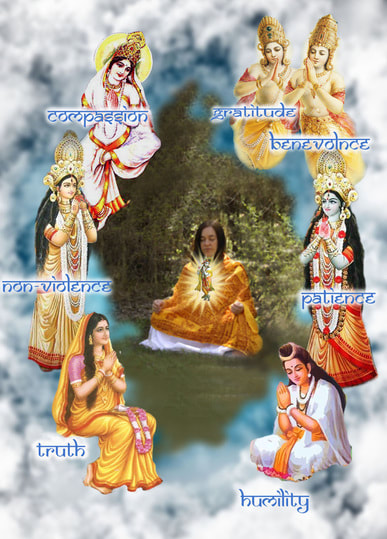 When our mind is focused on God, divine attributes (love, sympathy, honesty, kindness etc.) saturate our mind.
When our mind is focused on God, divine attributes (love, sympathy, honesty, kindness etc.) saturate our mind.
The actions influenced by Sattva guna are considered Punya or virtuous actions viz; truthfulness, honesty, sympathy, non-violence, giving alms, performing fire sacrifices etc. According to this verse, even virtuous actions are considered Adharma (Paap), if, while performing these actions, the mind is not surrendered to God. Why is it so, when the Vedas deem these actions as Dharma or Punya? (Read The Right Religion to know more about uplifting actions)
There are only three eternal entities in existence; jeev, God and Maya. We, the jeev, constantly seek happiness and search for that happiness in one of the two remaining areas - in God or in Maya i.e. the material world which has been manifested by Maya. The ignorant beings consider the material body to be 'I’ and search for happiness in sansaar - the world to satisfy their senses. Whereas, the wise ones know “I” to be the divine soul, which cannot attain happiness from material objects and hence by the process of elimination arrive at the conclusion that true happiness can only be attained by realizing God.
It is worth discerning that as soon as our mind goes into the world of Maya, all the vices of Maya (anger, passion, greed, violence, repulsion etc.) permeate our mind, leading us to commit sins. On the other hand, when our mind is focused on God, Divine Virtues (love, sympathy, honesty, kindness etc.) saturate our mind, thereby purifying our mind.
Reflect on this logic: It confirms that every moment the mind is not focused on God, it does nothing but commit sins. Hence we spend most of our time committing sins (to know more read Know the Results of Actions). Further, imagine if we committed just one sin in each of our past lifetimes, then we have already committed innumerable sins in our innumerable past lives.
There are only three eternal entities in existence; jeev, God and Maya. We, the jeev, constantly seek happiness and search for that happiness in one of the two remaining areas - in God or in Maya i.e. the material world which has been manifested by Maya. The ignorant beings consider the material body to be 'I’ and search for happiness in sansaar - the world to satisfy their senses. Whereas, the wise ones know “I” to be the divine soul, which cannot attain happiness from material objects and hence by the process of elimination arrive at the conclusion that true happiness can only be attained by realizing God.
It is worth discerning that as soon as our mind goes into the world of Maya, all the vices of Maya (anger, passion, greed, violence, repulsion etc.) permeate our mind, leading us to commit sins. On the other hand, when our mind is focused on God, Divine Virtues (love, sympathy, honesty, kindness etc.) saturate our mind, thereby purifying our mind.
Reflect on this logic: It confirms that every moment the mind is not focused on God, it does nothing but commit sins. Hence we spend most of our time committing sins (to know more read Know the Results of Actions). Further, imagine if we committed just one sin in each of our past lifetimes, then we have already committed innumerable sins in our innumerable past lives.
If we are sinners (patit) and God redeems sinners (patit-pawan), then why haven't we been purified yet?
|
In spite of committing sins every single moment, we do not accept ourselves to be sinners (read Scriptures say so! Are we sinners? for more detail). As a result, God's epithet “redeems sinners” does not work for us.
Think, if someone calls out, even one of our flaws, we lose our calm and composure. Why is that so? That is because of our false ego, which originates from ignorance. And the cause of ignorance is Maya. Lord Krishna says, दैवी ह्येषा गुणमयी मम माया दुरत्यया ।
Daivī hyēṣā guṇamayī mama māyā duratyayā. “This Maya is My power. There are three modes of Maya”. Though Maya is insentient, yet even those like Lord Brahma and Lord Shankar cannot overcome it because it is a power of Brahma - Supreme God Shri Krishna,
|
मामेव ये प्रपद्यन्ते मायामेतां तरन्तिते।।
गीता 7.14
Māmēva yē prapadyantē māyāmētāṁ tarantitē..
Gītā 7.14
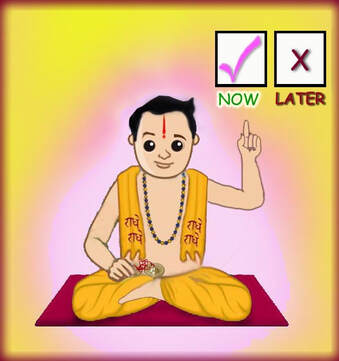 Surrender or accumulate more sins. It is our choice to expend effort to attain ever-increasing bliss. That choice can be made now for maximum gain or the decision can be procrastinated till eternity.
Surrender or accumulate more sins. It is our choice to expend effort to attain ever-increasing bliss. That choice can be made now for maximum gain or the decision can be procrastinated till eternity.
“No one can overcome Maya on their own. Only those who are fully surrendered to Me are able to cross this ocean of Maya by My grace”. (see How Can Maya Dominate Jeev?)
Conclusion:
Committing more sins does not qualify anyone for God’s grace. Surrendering to God does. Though we are patit, having accumulated innumerable sins in our present and past lives, patit-pawan God (redeemer of fallen souls) has not been able to help us cross the ocean of Maya because we did not surrender to Him. Instead of acknowledging that we are sinners we are defiant. Hence, God’s purifying powers cannot purify us.
Despite all the gravest of sins committed in the past, IF one day the jeev surrenders, then patit-pawan God forgives all the paap and punya performed by the jeev in the past. Furthermore, that jeev becomes the non-doer (कृतकृत्य) and the akaran-karun Shri Krishna becomes the pilot of that surrendered soul for the rest of eternity [1].
God is completely self-satisfied and filled with bliss (पूर्णकाम आत्माराम) [2]. He does not gain anything by us surrendering to Him. But we have much to gain by surrendering to God. Hence, the choice is ours whether to surrender [3][4][5] or keep accumulating more sins.
Conclusion:
Committing more sins does not qualify anyone for God’s grace. Surrendering to God does. Though we are patit, having accumulated innumerable sins in our present and past lives, patit-pawan God (redeemer of fallen souls) has not been able to help us cross the ocean of Maya because we did not surrender to Him. Instead of acknowledging that we are sinners we are defiant. Hence, God’s purifying powers cannot purify us.
Despite all the gravest of sins committed in the past, IF one day the jeev surrenders, then patit-pawan God forgives all the paap and punya performed by the jeev in the past. Furthermore, that jeev becomes the non-doer (कृतकृत्य) and the akaran-karun Shri Krishna becomes the pilot of that surrendered soul for the rest of eternity [1].
God is completely self-satisfied and filled with bliss (पूर्णकाम आत्माराम) [2]. He does not gain anything by us surrendering to Him. But we have much to gain by surrendering to God. Hence, the choice is ours whether to surrender [3][4][5] or keep accumulating more sins.

